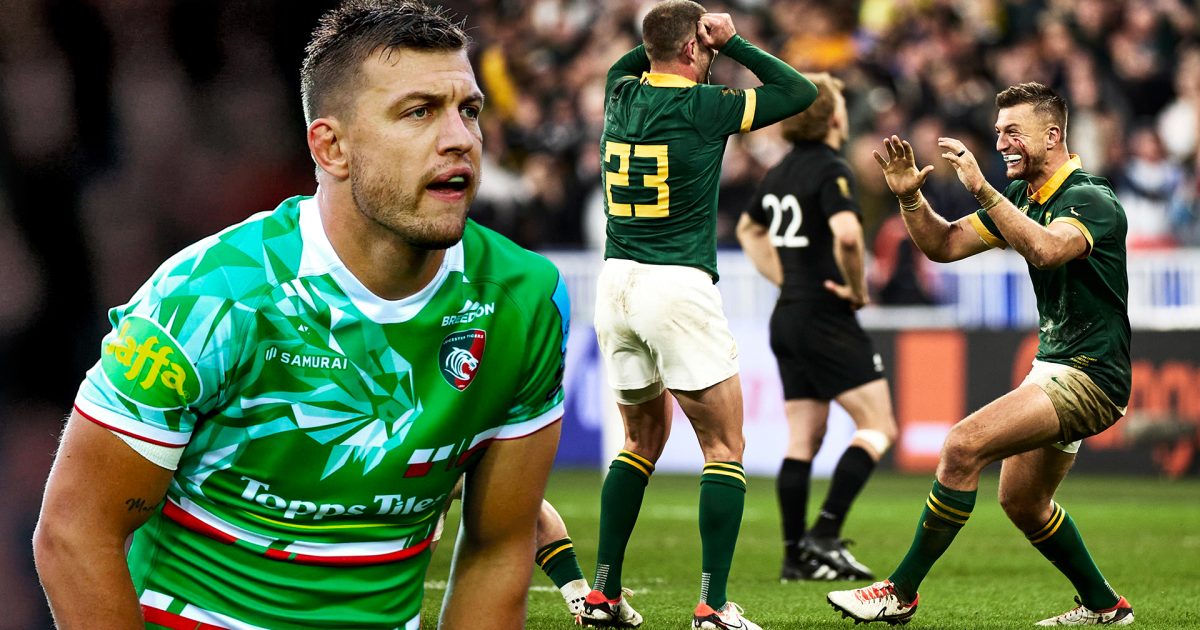Handre Pollard on unique RWC experience and life at Leicester

Less than a month has passed since Handre Pollard kicked South Africa to a historic 12-11 win over New Zealand in the Rugby World Cup final, and he’s already played two matches and made an impact for Leicester Tigers.
The double world cup winner was key against Northampton Saints this past weekend in what was a thrilling East Midlands derby that ended with a 26-17 victory and 16 points for the fly-half.
His general play was impressive and after kicking Leicester to a 9-3 lead at halftime, it was easy to see how he made such a difference to the Springboks’ campaign after only joining the tournament as a late injury replacement.
“Kicking like a Springbok still” 🇿🇦
Handrè Pollard puts @LeicesterTigers back in front in the East Midlands Derby #GallagherPrem pic.twitter.com/MNpJktmxZx
— Rugby on TNT Sports (@rugbyontnt) November 18, 2023
He kicked his fourth and final penalty before converting tries by fellow South Africans Francois van Wyk and Hanro Liebenberg, leading to the first home win of the season and joy for Welford Road.
He told Sky Sports this week that he’s only now just starting to process the craziness that has been his life these last few weeks.
“I think it’s going to take a while still. Of course, it’s great to be back at Leicester now, I think that’s going to help a lot with just sort of getting over it [the high of the World Cup]. As awesome as it is and amazing as it is, life goes on and you’ve got to get cracking again with the club, so it’s great to be back here.”
After initially not being selected for the 33-man squad due to an injury, Pollard was recovering at Leicester and managed just 40 minutes of game time before getting the call-up, due to hooker Malcolm Marx picking up an unfortunate knee injury.
With fly-half Manie Libbok playing well but struggling from the kicking tee, he said he wasn’t sure how his role would look when coming in.
“I just thought, listen, whatever I can contribute whether that’s just training and helping the team.. We’ve got a great culture in terms of that – the guys not playing, staying positive and knowing their role and how they’ve got to contribute and prepare the team for weekends – so I thought initially that was going to be my role, because the team were in a good place.
“I was open to do anything. If they needed me on game day, brilliant. If not, I had a different role to play. So that was my mindset going in.”
Unlike in 2019 in Japan, the Springboks’ path to retaining the trophy included having to play five of the top six teams in the world: Ireland, Scotland, France, England and then New Zealand in the final.
“What makes this one special is the route we had to take, the teams we had to play against.
“We played against the top 5 teams in the world in order to win the world cup. It’s unbelievable, and especially the quarter final, semi final, final. The one point is.. Winning one of those test matches in that manner is unbelievable and the emotional toll it takes on you, and the place you have to go to, to win those games.. And to do that three weeks in a row? That was unbelievable.”
What followed the final were scenes that eclipsed even the 2019 celebrations, as the Springboks went on a four-day victory tour by bus around South Africa, taking the trophy to the people. The outpouring of love and pride is perhaps what gave the Springboks the extra drive to win those one-point matches, and its what Pollard says makes them a formidable challenge going forward.
“It’s something we didn’t really understand when we were younger. We knew the Springboks were big and it’s a big part of our country. But then after 2019 we saw what’s capable, what we can do for the country. And it’s not going to change our country.
“All the problems aren’t going to go away. But the joy we can bring to those people, who sometimes go months, years without anything to smile about, and to see a smile on their faces next to the bus, that’s our purpose and that’s our bigger purpose.
“It brings something out of you as a player that, I think, you don’t even realise is there. It’s something we’re very sacred about and we’re going to protect that with everything we have going forward, because it’s truly special.
With the success of the world cup behind him, the 29-year-old is now firmly focused on putting on a good showing for his club, and is clearly loving life at Welford Road.
“It’s one of the most incredible places to play rugby. Playing at Welford Road is an experience that I always knew about as a young boy and people spoke about it, but now playing here, it is unbelievable and it’s such a privilege to be here.
“I’ve never played the game for trophies, and winning world cups is unbelievable, it’s great, but for me it’s the enjoyment, the camaraderie and playing with your teammates and having a beer in the locker room after a great win. That’s why I’ve always played the game.”





























































































The Iceman himself 👍👍👍 an absolute ace legend when under pressure. Him and Elizabhedi ❤️😉
Pollard is one hella asset for the Boks and Leicester!…a good honest solid fella, both in terms of game and life skillsets!